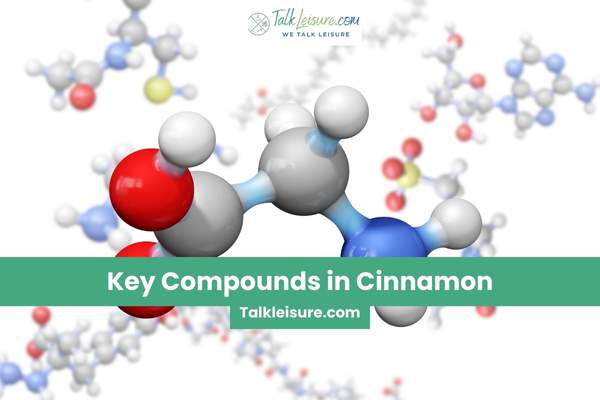More than just its delicious aroma, cinnamon, a fragrant spice that’s frequently found in our kitchen cabinets, has been drawing the interest of researchers.
Beyond its culinary and baking applications, cinnamon is being studied for its ability to reduce inflammation in the body.
As our bodies naturally react to injury or infection, inflammation can cause several health issues if it persists over an extended period of time.
This article explores the benefits of using cinnamon and its intriguing anti-inflammatory qualities.
We will journey through the state of knowledge today, covering everything from the components that make cinnamon unique to the research papers examining its benefits.
Is cinnamon really a natural anti-inflammatory?
Let’s examine the science and learn more about the possible health advantages this spice may have.
What Is Inflammation and Its Role in the Body?
Inflammation is a natural response of the body to injury or infection.
It is a mechanism that helps the body protect itself and heal from damage.
When the body detects an injury or an invading pathogen, the immune system triggers an inflammatory response.
During inflammation, several changes occur in the affected area:
- Increased blood flow:The blood vessels in the area expand, leading to increased blood flow.
This helps deliver immune cells and nutrients to the site of injury or infection.
- Increased permeability of blood vessels: The blood vessel walls become more permeable, allowing immune cells to easily move out of the bloodstream and into the affected tissue.
- Swelling: The accumulation of fluid and immune cells in the tissue leads to swelling.
- Redness and warmth: The increased blood flow causes redness and warmth in the affected area.
The role of inflammation is to remove harmful stimuli, initiate the healing process, and restore the normal functioning of the affected tissue.
What Are the Different Types of Inflammation and Their Effects?
There are two main types of inflammation: acute and chronic.
Acute Inflammation
Acute inflammation is a short-term response that occurs when there is an injury or infection.
It typically resolves within a few days or weeks and is characterized by redness, swelling, and pain.
Acute inflammation is necessary for the body’s healing process.
Chronic Inflammation
Chronic inflammation is a prolonged and persistent inflammatory response.
It can last for months or even years and is associated with a wide range of diseases such as arthritis, asthma, and cardiovascular diseases.
Chronic inflammation can damage tissues and organs and contribute to the development of various health conditions.
It is important to note that while inflammation is a necessary process for healing, chronic inflammation can be harmful to the body.
Understanding the different types of inflammation and their effects can help in managing and treating inflammatory conditions effectively.
What Are the Key Compounds in Cinnamon Responsible for Its Anti-inflammatory Properties?

Cinnamaldehyde
Cinnamaldehyde is the main active compound in cinnamon.
It is responsible for the characteristic flavor and scent of cinnamon.
Cinnamaldehyde has been found to have anti-inflammatory properties and may help reduce inflammation in the body.
Cinnamic Acid
Cinnamic acid is another important compound found in cinnamon.
It has been shown to possess antioxidant and anti-inflammatory effects.
Cinnamic acid may help reduce inflammation and protect against oxidative stress.
Cinnamate
Cinnamate is a compound that is derived from cinnamic acid.
It is also present in cinnamon and has been found to have anti-inflammatory properties.
Cinnamate may help reduce inflammation and alleviate symptoms associated with inflammatory conditions.
What Are the Potential Anti-inflammatory Benefits of Cinnamon?
Cinnamon, a popular spice known for its distinct flavor and aroma, contains compounds that have been found to have anti-inflammatory properties.
The main active compound in cinnamon, cinnamaldehyde, has shown promise in reducing inflammation in the body.
Additionally, cinnamic acid and cinnamate, other compounds found in cinnamon, also possess anti-inflammatory effects and may help alleviate symptoms associated with inflammatory conditions.
While more research is needed to fully understand the extent of cinnamon’s anti-inflammatory benefits, incorporating this spice into your diet may potentially aid in managing inflammation.
Whether in the form of sprinkling cinnamon over your morning oatmeal or adding it to your favorite recipes, cinnamon can be an enjoyable and flavorful way to support your overall health.
What Is the Scientific Evidence on Cinnamon’s Anti-Inflammatory Properties?
Animal and Lab Studies on Cinnamon’s Effects on Inflammation
Several animal and laboratory studies have been conducted to investigate the potential anti-inflammatory properties of cinnamon.
These studies have shown promising results, indicating that cinnamon has the ability to reduce inflammation in various ways.
Inhibition of Pro-inflammatory Enzymes
Cinnamon has been found to inhibit the activity of enzymes that promote inflammation, such as cyclooxygenase-2 (COX-2) and nitric oxide synthase (iNOS).
By inhibiting these enzymes, cinnamon helps to suppress the production of inflammatory compounds in the body.
Reduction in Inflammatory Markers
Research has shown that cinnamon can decrease the levels of certain inflammatory markers, including tumor necrosis factor-alpha (TNF-α) and interleukin-6 (IL-6).
These markers play a key role in the inflammatory response and their reduction indicates cinnamon’s potential anti-inflammatory effects.
Protection Against Oxidative Stress
Cinnamon possesses strong antioxidant properties, which help to protect cells from oxidative damage.
Oxidative stress is closely linked to inflammation, and by reducing oxidative stress, cinnamon can help alleviate inflammation.
Human Studies and Clinical Trials Investigating Cinnamon’s Anti-Inflammatory Benefits
Although more human studies and clinical trials are needed to fully understand cinnamon’s anti-inflammatory benefits, there is some evidence to suggest that this spice can be beneficial in managing inflammation.
- Cinnamon supplementation significantly reduced markers of inflammation, such as high-sensitivity C-reactive protein (hs-CRP) and interleukin-6 (IL-6).
- Cinnamon supplementation led to a decrease in fasting blood glucose levels and inflammatory markers, including TNF-α and IL-6.
While these studies provide preliminary evidence for cinnamon’s anti-inflammatory effects in humans, large-scale studies are needed to confirm these findings and determine the optimal dosage and duration of cinnamon supplementation for inflammation management.
What Are the Various Ways to Consume Cinnamon for Its Anti-inflammatory Effects?
Cinnamon has shown potential as an anti-inflammatory agent, and incorporating it into your diet may be beneficial.
Here are some ways you can consume cinnamon:
- Sprinkle cinnamon on oatmeal or yogurt for breakfast.
- Use cinnamon in baking recipes for a warm and spicy flavor.
- Brew cinnamon tea by steeping a cinnamon stick in hot water.
- Sprinkle cinnamon over roasted vegetables or sweet potatoes for a touch of sweetness.
- Incorporate cinnamon into spice rubs for meats or tofu.
Recommended Dosage and Precautions When Using Cinnamon As An Anti-inflammatory Agent
While cinnamon may have potential anti-inflammatory effects, it is important to use it responsibly and consult with a healthcare professional.
The recommended dosage of cinnamon varies depending on the condition being treated and the individual’s health status.
It is advisable to start with small amounts and monitor how your body responds.
However, it is essential to note that cinnamon should not replace medical treatment for chronic inflammatory conditions, and it is crucial to follow the advice of your healthcare professional.
Additionally, some individuals may experience adverse effects from consuming large amounts of cinnamon, such as mouth sores or allergic reactions.
If you have any concerns or existing health conditions, it is best to seek medical advice before incorporating cinnamon into your diet.
What Are the Other Health Benefits of Cinnamon?

Cinnamon’s Role in Blood Sugar Regulation and Managing Diabetes
Cinnamon has also been studied for its potential role in blood sugar regulation and managing diabetes.
Some research suggests that cinnamon may help improve insulin sensitivity and reduce fasting blood sugar levels in individuals with type 2 diabetes.
However, more studies are needed to fully understand the mechanisms behind these effects and determine the optimal dosage and duration of cinnamon supplementation.
Cinnamon’s Potential Antioxidant and Antimicrobial Properties
In addition to its anti-inflammatory effects, cinnamon has also been investigated for its potential antioxidant and antimicrobial properties.
The antioxidants in cinnamon may help protect against oxidative stress and damage caused by free radicals in the body.
Furthermore, cinnamon has been shown to possess antimicrobial properties, which may help inhibit the growth of bacteria and fungi.
Conclusion
Inflammation is a natural body response to injury or infection, triggering the immune system to protect itself and heal.
It involves increased blood flow, increased permeability of blood vessels, swelling, and redness.
There are two main types of inflammation: acute and chronic.
Cinnamon, a popular spice, contains key compounds like cinnamaldehyde, cinnamic acid, and cinnamate, which have anti-inflammatory properties.
These compounds may help reduce inflammation and alleviate symptoms associated with inflammatory conditions.
While more research is needed, incorporating cinnamon into your diet may potentially aid in managing inflammation.
Studies have shown that cinnamon can reduce inflammation by inhibiting pro-inflammatory enzymes, reducing inflammatory markers, and protecting against oxidative stress.
While more research is needed to confirm these findings, cinnamon has some evidence to suggest its potential in managing inflammation.
Consuming cinnamon can be beneficial in various ways, such as incorporating it into smoothies, baking recipes, or spice rubs.
However, it is important to use it responsibly and consult with a healthcare professional.
Cinnamon also has potential health benefits in blood sugar regulation and diabetes management.
FAQs
01. What Foods Are Anti-Inflammatory?
Inflammation is a natural response of the immune system to injury or infection.
However, chronic inflammation can contribute to the development of various diseases, such as heart disease, diabetes, and certain types of cancer.
One way to combat inflammation is by incorporating anti-inflammatory foods into your diet.
Fatty Fish
Fish like salmon, mackerel, and sardines are rich in omega-3 fatty acids, which have powerful anti-inflammatory properties.
They can help reduce inflammation in the body and protect against chronic diseases.
Berries
Berries such as strawberries, blueberries, and raspberries are packed with antioxidants, which can help fight inflammation.
They are also high in fiber, which has been shown to have anti-inflammatory effects.
Leafy Greens
Vegetables like spinach, kale, and Swiss chard are loaded with vitamins, minerals, and antioxidants that can help reduce inflammation.
They are also low in calories and high in fiber, making them a great addition to a healthy diet.
Turmeric
This bright yellow spice contains a compound called curcumin, which has strong anti-inflammatory properties.
Adding turmeric to your meals or drinking turmeric tea can be a flavorful way to reduce inflammation.
Olive Oil
Olive oil is rich in monounsaturated fats and antioxidants, which can help reduce inflammation.
It is also a key component of the Mediterranean diet, which is known for its anti-inflammatory effects.
Nuts
Almonds, walnuts, and other nuts are high in healthy fats, fiber, and antioxidants, all of which can help fight inflammation.
They make a great snack and can be added to salads or oatmeal.
Incorporating these anti-inflammatory foods into your diet can help reduce chronic inflammation and improve your overall health.
Remember to always consult with a healthcare professional or registered dietitian before making any significant changes to your diet.
02. What not to Drink for Inflammation?
While incorporating anti-inflammatory foods into your diet can be beneficial for reducing inflammation, it’s equally important to be aware of what you should avoid consuming.
Certain drinks can actually promote inflammation in the body, undoing the positive effects of a healthy diet.
Here are some beverages you should steer clear of if you’re looking to reduce inflammation.
Sugary drinks
Beverages like soda, fruit juices with added sugars, and sweetened iced teas can have a detrimental impact on inflammation.
These sugary drinks can lead to increased levels of insulin, a hormone that can trigger inflammation in the body.
Alcohol
Excessive alcohol consumption can cause inflammation in various organs, including the liver and pancreas.
It can also weaken the immune system, making it harder for the body to combat inflammation.
Energy Drinks
High in sugar, caffeine, and artificial ingredients, energy drinks can contribute to inflammation due to their impact on blood sugar levels and oxidative stress in the body.
Sweetened Coffee and Tea
Adding sugar or artificial sweeteners to your coffee or tea can increase inflammation.
Instead, opt for unsweetened varieties or use natural sweeteners like honey or stevia in moderation.
Sports Drinks
While these drinks can be beneficial for electrolyte replacement during intense exercise, they are often loaded with sugar and artificial ingredients.
This can promote inflammation when consumed in excess.
By avoiding these inflammatory drinks and opting for healthier alternatives like water, herbal teas, and unsweetened beverages, you can support your body’s efforts to reduce inflammation and promote overall health.
Best Wishes!












